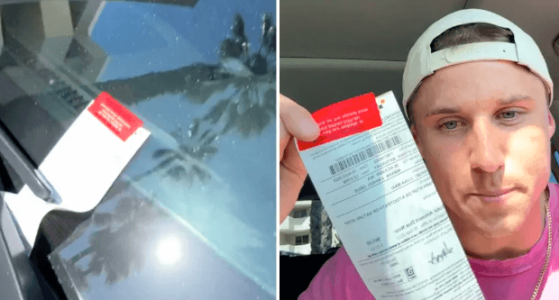Is it really possible to get away with not paying parking tickets?
- Replies 2
Many Aussies know there's no escaping those pesky parking tickets… But as it turns out, sometimes you could avoid getting fined for parking in an unauthorised area!
It sounds a little too good to be true, but according to one Western Australian driver, you don't always have to pay a parking fee.
The driver, Connor Wright, was expecting the worst when he returned to his car to find a penalty notice stuck to the windscreen, courtesy of Parking Enforcement Services (PES).
However, he decided to read the fine print carefully and later ripped the ticket in a now-viral video on social media. In it, he spread the news to other drivers, telling them, 'Make sure to read the fine print on these.'
Apparently, on the back of the ticket, it read: 'This is not a parking fine.'
So, what are these tickets exactly, and how could it be possible to get away with them?
Essentially, parking in private car parks like in shopping centres requires drivers to follow their terms and conditions. Breaching the contract could result in what's called a 'breach notice', starting at a $65 fee.
'What they try and do is recover the debt for the loss incurred, effectively like a breach of contract,' James Clements from Sydney Criminal Lawyers explained.
However, Mr Clements added that these penalties are not legally enforceable as only statutory bodies can issue fines.
What private parking companies can do, though, is to make use of towing and other intimidating tactics in order to 'scare people into paying them', according to Mr Clements.
He also revealed that, in recent years, several states have adopted measures to prevent these companies from accessing driver information with the purpose of levying fines.
In New South Wales, a piece of legislature referred to as Section 279 of the NSW Road Transport Act has made it so private companies can no longer access driver information.
Also, these companies have to prove that it was the driver in question—not just the car—who breached the contract, as well as successfully justify the loss they claim to have incurred as a result of the offence.
These measures have made it almost impossible for private parking companies to recoup any losses for breaches made in their car parks, so much so that when a breach notice is issued, the best course of action to take is, per Mr Clements, to 'ignore it'.
Mr Clements advised drivers to dispute the penalty notice and, if necessary, write back and point out that they do not intend to pay the fee.

Members, when it comes to parking anywhere, be it in a private or public area, it's important to read and understand the signs in place. This could save you a lot of trouble compared to disputing a fee that could have been easily avoided. Not only will this make the whole thing hassle-free, but it could also save you a lot of headaches in the future!
That said, we'd like to emphasise that rules may differ across states and territories and that this article is in no way intended to be taken as legal advice.
So, what do you think? Was the article helpful? Do you know any other lesser-known advice for the road? Share it with us in the comments below!
It sounds a little too good to be true, but according to one Western Australian driver, you don't always have to pay a parking fee.
The driver, Connor Wright, was expecting the worst when he returned to his car to find a penalty notice stuck to the windscreen, courtesy of Parking Enforcement Services (PES).
However, he decided to read the fine print carefully and later ripped the ticket in a now-viral video on social media. In it, he spread the news to other drivers, telling them, 'Make sure to read the fine print on these.'
Apparently, on the back of the ticket, it read: 'This is not a parking fine.'
So, what are these tickets exactly, and how could it be possible to get away with them?
Essentially, parking in private car parks like in shopping centres requires drivers to follow their terms and conditions. Breaching the contract could result in what's called a 'breach notice', starting at a $65 fee.
'What they try and do is recover the debt for the loss incurred, effectively like a breach of contract,' James Clements from Sydney Criminal Lawyers explained.
However, Mr Clements added that these penalties are not legally enforceable as only statutory bodies can issue fines.
What private parking companies can do, though, is to make use of towing and other intimidating tactics in order to 'scare people into paying them', according to Mr Clements.
He also revealed that, in recent years, several states have adopted measures to prevent these companies from accessing driver information with the purpose of levying fines.
In New South Wales, a piece of legislature referred to as Section 279 of the NSW Road Transport Act has made it so private companies can no longer access driver information.
Also, these companies have to prove that it was the driver in question—not just the car—who breached the contract, as well as successfully justify the loss they claim to have incurred as a result of the offence.
These measures have made it almost impossible for private parking companies to recoup any losses for breaches made in their car parks, so much so that when a breach notice is issued, the best course of action to take is, per Mr Clements, to 'ignore it'.
Mr Clements advised drivers to dispute the penalty notice and, if necessary, write back and point out that they do not intend to pay the fee.
Key Takeaways
- A Western Australian driver, Connor Wright, advises fellow drivers to 'ignore' penalty notices issued by private parking companies like Wilson Parking.
- Drivers enter into a contractual agreement when using private car parks, and any breach of this agreement, such as exceeding time limits, may result in a 'breach notice'.
- James Clements from Sydney Criminal Lawyers says these penalties are not enforceable fines but 'bullying tactics' to coerce payment and that it's difficult for private companies to prove who was driving at the time of the alleged breach.
- Mr Clements advises those who receive such a notice to either ignore it or dispute it, but he discourages disclosing that they were the driver to avoid potential legal repercussions.
Members, when it comes to parking anywhere, be it in a private or public area, it's important to read and understand the signs in place. This could save you a lot of trouble compared to disputing a fee that could have been easily avoided. Not only will this make the whole thing hassle-free, but it could also save you a lot of headaches in the future!
That said, we'd like to emphasise that rules may differ across states and territories and that this article is in no way intended to be taken as legal advice.
So, what do you think? Was the article helpful? Do you know any other lesser-known advice for the road? Share it with us in the comments below!








